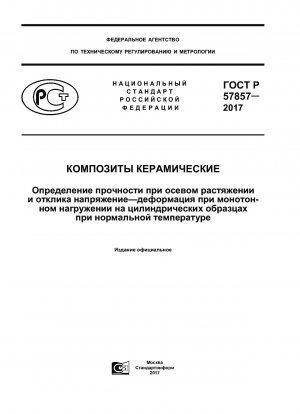ASTM C1773-13
Standard Test Method for Monotonic Axial Tensile Behavior of Continuous Fiber-Reinforced Advanced Ceramic Tubular Test Specimens at Ambient Temperature
- Standard No.
- ASTM C1773-13
- Release Date
- 2013
- Published By
- American Society for Testing and Materials (ASTM)
- Status
- Replace By
- ASTM C1773-17
- Latest
- ASTM C1773-21
- Scope
5.1 This test method provides information on the uniaxial tensile properties and tensile stress-strain response of a ceramic composite tube—tensile strength and strain, fracture strength and strain, proportional limit stress and strain, tensile elastic modulus, etc. The information may be used for material development, material comparison, quality assurance, characterization, and design data generation.
5.2 Continuous fiber-reinforced ceramic composites (CFCC) are composed of continuous ceramic-fiber directional (1-D, 2-D, and 3-D) reinforcements in a fine grain-sized (lt;50 micron) ceramic matrix with controlled porosity. Often these composites have an engineered thin (0.1 to 10 microns) interface coating on the fibers to produce crack deflection and fiber pull-out. These ceramic composites offer high temperature stability, inherent damage tolerance, and high degrees of wear and corrosion resistance. As such, these ceramic composites are particularly suited for aerospace and high temperature structural applications. (1, 2)3
5.3 CFCC components have a distinctive and synergistic combination of material properties, interface coatings, porosity control, composite architecture (1-D, 2-D, and 3-D), and geometric shape that are generally inseparable. Prediction of the mechanical performance of CFCC tubes (particularly with braid and 3-D weave architectures) cannot be made by applying measured properties from flat CFCC plates to the design of tubes. Direct uniaxial tensile strength tests of CFCC tubes are needed to provide reliable information on the mechanical behavior and strength of tube geometries.
5.4 CFCCs generally experience “graceful” fracture from a cumulative damage process, unlike monolithic advanced ceramics which fracture catastrophically from a single dominant flaw. The tensile behavior and strength of a CFCC are dependent on its inherent resistance to fracture, the presence of flaws, and any damage accumulation processes. These factors are affected by the composite material composition and variability in material and testing—components, reinforcement architecture and volume fraction, porosity content, matrix morphology, interface morphology, methods of material fabrication, test specimen preparation and conditioning, and surface condition.
5.5 The results of tensile tests of test specimens fabricated to standardized dimensions from a particular material or selected portions of a part, or both, may not totally represent the strength and deformation properties of the entire, full-size end product or its in-service behavior in different environments.
5.6 For quality control purposes, results derived from standardized tubular tensile test specimens may be considered indicative of the response of the material from which they were taken from, given primary processing conditions and post-processing heat treatments.
1.1 This test method determines the axial tensile strength and stress-strain response of continuous fiber-reinforced advanced ceramic composite tubes at ambient temperature under monotonic loading. This test method is specific to tube geometries, because fiber architecture a......
ASTM C1773-13 history
- 2021 ASTM C1773-21 Standard Test Method for Monotonic Axial Tensile Behavior of Continuous Fiber-Reinforced Advanced Ceramic Tubular Test Specimens at Ambient Temperature
- 2017 ASTM C1773-17 Standard Test Method for Monotonic Axial Tensile Behavior of Continuous Fiber-Reinforced Advanced Ceramic Tubular Test Specimens at Ambient Temperature
- 2013 ASTM C1773-13 Standard Test Method for Monotonic Axial Tensile Behavior of Continuous Fiber-Reinforced Advanced Ceramic Tubular Test Specimens at Ambient Temperature

Copyright ©2024 All Rights Reserved